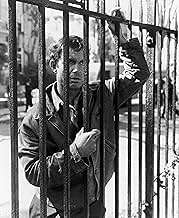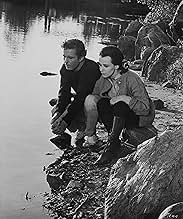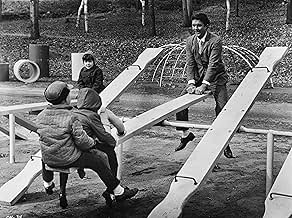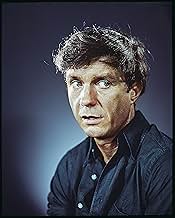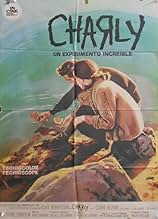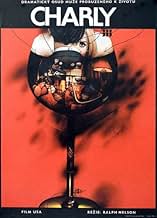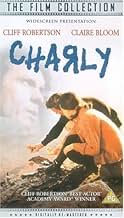IMDb-BEWERTUNG
6,9/10
7627
IHRE BEWERTUNG
Ein geistig behinderter Mann unterzieht sich einem Experiment, das ihm die Intelligenz eines Genies verleiht.Ein geistig behinderter Mann unterzieht sich einem Experiment, das ihm die Intelligenz eines Genies verleiht.Ein geistig behinderter Mann unterzieht sich einem Experiment, das ihm die Intelligenz eines Genies verleiht.
- Regie
- Drehbuch
- Hauptbesetzung
- 1 Oscar gewonnen
- 4 Gewinne & 6 Nominierungen insgesamt
Dick Van Patten
- Bert
- (as Richard Van Patten)
Edward McNally
- Gimpy
- (as Skipper McNally)
Marianna Case
- Young Woman
- (Nicht genannt)
Leon Collins
- Tap Dancer
- (Nicht genannt)
Harry Cooper
- Conference Attendee
- (Nicht genannt)
Frank Dolan
- Eddie
- (Nicht genannt)
Randee Lynne Jensen
- Extra
- (Nicht genannt)
Ralph Nelson
- Convention Speaker
- (Nicht genannt)
Donald Warnock
- Conference Attendee
- (Nicht genannt)
Empfohlene Bewertungen
10JDFeltz
I saw this movie at the drive-in when I was 12. I recall finding it to be a touching tragedy. I used to volunteer with "the special ed class", and found the students there to be gentle and grateful and affectionate, and could never understand how the other kids could make fun of them the way they did. But that only explains how and why this touched me personally, even at the age of 12.
Reviews some 30 years after this film was made are very critical, calling it 'schlock', and criticizing the simplification of a complex issue. However, over the last 30-40 years, society has become more enlightened about both mental retardation, but also about what science can and cannot do. It was easier to suspend belief and go with the concept.
At the time, this movie conveyed something new about how a mentally retarded person might view their situation....that alone made this film unique; lots of people never even considered the feelings of the mentally retarded, so this film surely opened some eyes.
And way ahead of it's time (I'm sure this was never considered in making the film), because it conveys the feelings and reactions of someone who is losing their intellectual capacity....such as those suffering from dementia or Alzheimer's. At that time, little thought was given by the average person about the feelings of either the mentally retarded, or people with Alzheimer's or dementia.
I'm sure the book was better than the movie; that almost always goes without saying. However, movies reach audiences that books sometimes don't, and this movie reached a new audience.
I'm afraid too many reviewers are unable to see an older movie and not hold it to the same standards, socially, scientifically and a cinematography standpoint. Cinema has evolved, as has society and science, and it's quite interesting to watch "Charly" with that in mind.
Reviews some 30 years after this film was made are very critical, calling it 'schlock', and criticizing the simplification of a complex issue. However, over the last 30-40 years, society has become more enlightened about both mental retardation, but also about what science can and cannot do. It was easier to suspend belief and go with the concept.
At the time, this movie conveyed something new about how a mentally retarded person might view their situation....that alone made this film unique; lots of people never even considered the feelings of the mentally retarded, so this film surely opened some eyes.
And way ahead of it's time (I'm sure this was never considered in making the film), because it conveys the feelings and reactions of someone who is losing their intellectual capacity....such as those suffering from dementia or Alzheimer's. At that time, little thought was given by the average person about the feelings of either the mentally retarded, or people with Alzheimer's or dementia.
I'm sure the book was better than the movie; that almost always goes without saying. However, movies reach audiences that books sometimes don't, and this movie reached a new audience.
I'm afraid too many reviewers are unable to see an older movie and not hold it to the same standards, socially, scientifically and a cinematography standpoint. Cinema has evolved, as has society and science, and it's quite interesting to watch "Charly" with that in mind.
A mentally challenged man named Charly (Cliff Robertson) desires to become smarter so that he wouldn't always be picked on by his so-called friends at his workplace. However, he has made no progress despite his efforts of going to school. One day he gets a chance to undergo some experimental brain surgery and his intelligence skyrockets, making him a genius. Still, he cannot stop feeling like an outsider or find happiness with Alice, the woman he loves (Claire Bloom).
The director uses many split screens and other alienating techniques to portray the fragile mental state of Charly; at points they get rather annoying and look dated. The montage near the end, depicting the progression of Charly and Alice's relationship, comes across as rather hasty, considering the scene directly preceding it. Mostly the story advances fine though, and the pondering about the surgery's effects on Charly's psyche is interesting – there should have been more of it, actually. Robertson's Oscar-winning performance in the lead role is decent, although I preferred his calm 'intelligent Charly' to his naïve 'challenged Charly'.
The director uses many split screens and other alienating techniques to portray the fragile mental state of Charly; at points they get rather annoying and look dated. The montage near the end, depicting the progression of Charly and Alice's relationship, comes across as rather hasty, considering the scene directly preceding it. Mostly the story advances fine though, and the pondering about the surgery's effects on Charly's psyche is interesting – there should have been more of it, actually. Robertson's Oscar-winning performance in the lead role is decent, although I preferred his calm 'intelligent Charly' to his naïve 'challenged Charly'.
A mildly mentally retarded man submits to a scientific experiment to increase his intelligence. Like "Frankenstein", "Charly" is a clever morality play about science that crosses certain boundaries. Unlike "Frankenstein", which took the horror route, "Charly" explores the emotional human tragedy that inevitably occurs when an experiment of this nature goes awry.
Many scientists back then and even today argue that the professional boundaries that were crossed in this story would never happen in real life. Yet with the recent successful gene manipulation and cloning experiments many believe it is only a matter of time, a very short time, before a human submits to such experiments.
The movie, of course, is not this clinical. Based on the classic novel, "Flowers for Algernon", the movie strikes a keen balance of warmth, comedy and tragedy. Cliff Robertson's fascinating portrayal of the main character is unforgettable. His delivery of the powerful speech at the scientific convention is just as stunning and eerily accurate today as it was over thirty years ago.
An emotional, touching drama, "Charley" still rings a cautionary bell. One that should be heard and not ignored as we enter the new millennium.
Many scientists back then and even today argue that the professional boundaries that were crossed in this story would never happen in real life. Yet with the recent successful gene manipulation and cloning experiments many believe it is only a matter of time, a very short time, before a human submits to such experiments.
The movie, of course, is not this clinical. Based on the classic novel, "Flowers for Algernon", the movie strikes a keen balance of warmth, comedy and tragedy. Cliff Robertson's fascinating portrayal of the main character is unforgettable. His delivery of the powerful speech at the scientific convention is just as stunning and eerily accurate today as it was over thirty years ago.
An emotional, touching drama, "Charley" still rings a cautionary bell. One that should be heard and not ignored as we enter the new millennium.
Before there was "Awakenings" (1990) and "Good Will Hunting" (1997), there was a sincere, sad, and bittersweet film called "Charly" (1968). The film is based on the book "The Two Worlds of Charly Gordon." Cliff Robertson delivers a brilliant performance as a mentally retarded man who becomes a genius through scientific experiments. Claire Bloom is Charly's social worker (and love interest). The film is directed by Ralph Nelson ("Lillies of the Field"). score: 8 (out of 10).
The film is wonderful in many aspects. The acting is first-rate; Oscars usually aren't handed out on a whim. Cliff Robertson delivered the performance of his career in this film.
There are elements of science fiction and psychological action in the film. You have been warned. These segments are well done and add to the film as opposed to creating a negative side-track.
I suggest that anyone watching Charly first read at least part of Daniel Keyes's "Flowers for Algernon" for basic background. The film makes more sense after reading the novel.
All in all, Charly is a worthwhile experience. Some may not like the film, but I find it to be one of the best of the 1960s.
There are elements of science fiction and psychological action in the film. You have been warned. These segments are well done and add to the film as opposed to creating a negative side-track.
I suggest that anyone watching Charly first read at least part of Daniel Keyes's "Flowers for Algernon" for basic background. The film makes more sense after reading the novel.
All in all, Charly is a worthwhile experience. Some may not like the film, but I find it to be one of the best of the 1960s.
Wusstest du schon
- WissenswertesAfter the operation, when Charly loses his temper over being beaten once again by the mouse, no one seems to notice that he is now pronouncing Algernon's name with the first N included, instead of his previous "Algeron" with the missing N.
- PatzerWhen Charly is talking to Mrs. Kinnian outside the building for his night class, he's wearing a gold vest. When the camera cuts back to him after Mrs. Kinnian enters her car, he's wearing a blue vest.
- Zitate
Charly Gordon: I was wondering why the people who would never dream of laughing at a blind or a crippled man would laugh at a moron?
- Crazy CreditsThe title appears onscreen as if scrawled by a child, with the "R" backwards.
- VerbindungenFeatured in The 70th Annual Academy Awards (1998)
Top-Auswahl
Melde dich zum Bewerten an und greife auf die Watchlist für personalisierte Empfehlungen zu.
Details
- Erscheinungsdatum
- Herkunftsland
- Sprache
- Auch bekannt als
- The Two Worlds of Charly Gordon
- Drehorte
- Produktionsfirmen
- Weitere beteiligte Unternehmen bei IMDbPro anzeigen
Box Office
- Bruttoertrag in den USA und Kanada
- 15.826.800 $
- Weltweiter Bruttoertrag
- 18.530.000 $
Zu dieser Seite beitragen
Bearbeitung vorschlagen oder fehlenden Inhalt hinzufügen

